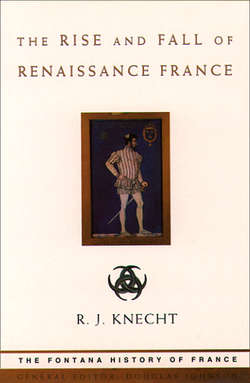Читать книгу The Rise and Fall of Renaissance France - R. Knecht J. - Страница 37
The imperial election (1519)
ОглавлениеOn 12 January 1519 the Holy Roman Emperor, Maximilian I, died, causing another major upheaval of Europe’s power structure. The Empire was an elective dignity, not a hereditary one, the emperor being chosen by seven Electors: the archbishops of Mainz, Cologne and Trier, the king of Bohemia, the Elector-Palatine, the duke of Saxony and the margrave of Brandenburg. They were not obliged to choose a Habsburg or even a German, for the Empire was a supra-national dignity, the secular counterpart of the papacy. Thus it was possible for a Frenchman to be a candidate.
In 1516, even before Maximilian’s death, the archbishops of Mainz and Trier had invited Francis to stand for election, promising him their votes. They had soon been joined by Joachim of Brandenburg and the Elector-Palatine, so that the king could reasonably expect a majority in his favour in the electoral college. The Empire attracted him not only for its international prestige, but also because he wanted to keep it out of the hands of Maximilian’s grandson Charles, who was already powerful enough. As he explained, ‘The reason which moves me to gain the Empire … is to prevent the said Catholic King from doing so. If he were to succeed, seeing the extent of his kingdoms and lordships, this could do me immeasurable harm; he would always be mistrustful and suspicious, and would doubtless throw me out of Italy.’
The Electors were less interested in Francis’s candidature than in promoting a contest. Under rules laid down in the Golden Bull, an imperial election was supposed to be free of corruption. In practice, however, it resembled an auction. As the Habsburgs marshalled their resources, Francis did likewise. He sent envoys to the Electors with 400,000 écus to distribute as bribes. When Charles Guillart suggested that persuasion might be preferable to bribery, Francis strongly disagreed. He was better placed than his rival to win the election, for he was closer to Germany and allowed his agents a free hand, whereas Charles was far away in Spain and would not allow his agents to concede anything without his prior approval. But Francis was denied the co-operation of the German bankers, who sided with the Habsburgs if only because they controlled the silver mines of central Europe. Consequently, he was denied exchange facilities and obliged to send ready cash to Germany at a time when the roads were infested with brigands.
German public opinion was also strongly anti-French. Habsburg agents used every means, including sermons and illustrated broadsheets, to stir up suspicion and hatred of the French. Germans were led to believe that the bribes Francis was distributing had been forcibly taken from his subjects and that a comparable fate would befall themselves if he were elected. Francis countered this propaganda by claiming that he, rather than Charles, would be the more effective champion of Christendom against the Turkish Infidel.
On 8 June 1519 the Electors gathered at Frankfurt under the shadow of the army of the Swabian League. No Frenchmen, said Henry of Nassau, would enter Germany save on the points of spears and swords. At the eleventh hour Leo X, who had so far supported Francis as the lesser of two evils (he did not wish to see a union of the imperial and Neapolitan crowns), changed his mind. Even Francis gave up hope of winning. On 26 June he withdrew his candidature and, two days later, Charles was chosen unanimously.
Historians have often assumed that the rivalry which developed between Francis and Charles stemmed from the imperial election. Francis was undoubtedly vexed by the result, particularly as he had wasted some 400,000 écus on bribes. But his disappointment was dwarfed by the political implications of the election. Before Charles could be a fully-fledged emperor, he needed to be crowned by the pope in Italy. He was likely to go there in force and would almost certainly threaten Francis’s hold on Milan, particularly as the emperor was the duchy’s suzerain. The pope, too, had reason to fear Habsburg domination of the peninsula. On 22 October he signed a secret treaty with Francis. While the king promised to defend the States of the Church against Charles, Leo undertook to deny Charles the investiture of Naples.
